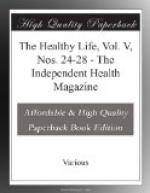Regular readers will recognise in this wonderfully simple and suggestive article a continuation of the series previously entitled “Healthy Brains.” The author of “The Children All Day Long” is an intimate disciple of one of the greatest living psychologists, and she has a message of the first importance to all who realise that true health depends as much on poise of mind as on physical fitness.—[EDS.]
The fruit of imagination ripens into deeds actually done in the service of man: its flower brightens the whole of life and makes it fragrant, from the budding-time of children’s play and laughter to the developed blossoms of the creative imagination which we call painting or poetry or music.
Play and art have this in common, that they are activities pursued for the sake of the activity itself, not as a means to any other object, not aiming at any material usefulness. Actually, of course, there is nothing more useful, on every scale of usefulness, than the development of the individual in art or play, but these would never be really themselves while an ulterior purpose formed a background to them in consciousness.
Physical exercises devised for the sake of health are a more or less pleasant form of work; they do not take the place of play. Our ordinary work is usually more or less one-sided and unbalanced in the demands it makes upon us; we therefore try to find what other set of movements will undo this unbalancement and give us back unbiased bodies. When that is done, and not till then, we get freedom, and it is at that moment that real “play” begins—the use of the freed muscles according to our own will and pleasure.
The same thing is perhaps true in connection with our minds. We all see the fallacy of the old-fashioned hustlers’ cry, “Make your work your hobby; think of nothing else; let every moment be subordinated to the dominating idea of your career; put aside all sentimentalism, all laziness and self-will, all enthusiasm about things not in your own line of work.”
We have come to see that this kind of effort leads often to nervous breakdown and early death; always to a certain narrowing of sympathy and hardening of method even in the career itself. So we conscientiously “take up” a hobby or a sport and set aside some hour or day for indulgence in it. We make it a duty to lay aside for the time being all idea of duties; part of our work is to learn to rest.
So far so good. But does all this go far enough?
Work imposed by any set of outer needs puts the whole being under a certain strain. The aim of remedial exercises, prescribed rest-times and legal holidays is to undo this strain, to unwind us from our coil by twisting us the other way.
When this has been satisfactorily done, too
often the person
responsible thinks that this is enough.
But it is really and truly at
this moment that one is beginning one’s
real life.




